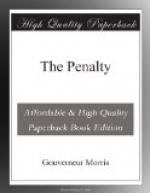If the father’s heritage, drink and women, were spared him, or at least that part of him which was really noble, a love of cleanness, clear-mindedness, and purity, died hard. But gambling was second nature to him. He could not enjoy a game unless he had something on it; and all book-makers and proprietors of gambling-houses were friends of his and called him by his first name. Sometimes through a series of lucky turns he rose to heights of picturesque affluence; more often he was stone-broke; but so much money passed through his hands in the course of a year that it was always possible for him to borrow and live well enough on credit. Money became his passion, not for its own sake, not for the sake of what it could buy, but because it was a game upon which the best wits of the world have been engaged for ages and ages—and because you have to have it, or be able to owe so much that it amounts to the same thing.
At first when he got in a hole, owed money which he saw no way of raising, Wilmot suffered all the anguish and remorse of the trustee who has speculated with orphans’ funds (for the first time) and lost them. Gradually he became hardened. And those who knew him best could never tell whether he was worth fifty thousand or had just lost that much. He drew upon a stock of courage and cheerfulness worthy of even the noblest cause, until the term “self-respect” dropped automatically from his inner vocabulary and his moral sense became a rotten, rusty buckler through which the spear of temptation or necessity passed like a pin through a sheet of tissue-paper.
He put himself under obligation—in moments of supreme need—to dangerous persons, and suffered from the familiarity and perhaps the contempt of some who were his inferiors in breeding, in heart, and in soul.
One day, being at his wit’s end, he walked rapidly, seeking light, through a quarter of the city which was not familiar to him. He was in that mood when a man does not wish to be at the trouble of nodding or exchanging a word even with his best friend. A voice hailed him, “Mr. Allen.”
He stopped and saw that the voice came from a legless man who sat in the sun by a hand-organ on which were displayed for sale a few pairs of shoe-laces and, to excite charity, a battered (and empty) tin cup.
“Have you forgotten me?”
The light of recognition had twinkled instantly in Wilmot’s eyes, for he was wonderful at remembering faces. And he smiled and said:
“Of course not. How are you?”
“Pretty well,” said the beggar. “And you?”
“Pretty well.”
Wilmot’s giving hand had slipped automatically into his trousers pocket. Then, for once in his charitable life, he hesitated, since the pocket contained nothing but a ten-dollar bill, and that was all the money he had in the world with which to meet a pressing note of ten thousand. His hesitation lasted only a moment. He laughed and stuffed the ten-dollar bill into the cup, and said:




